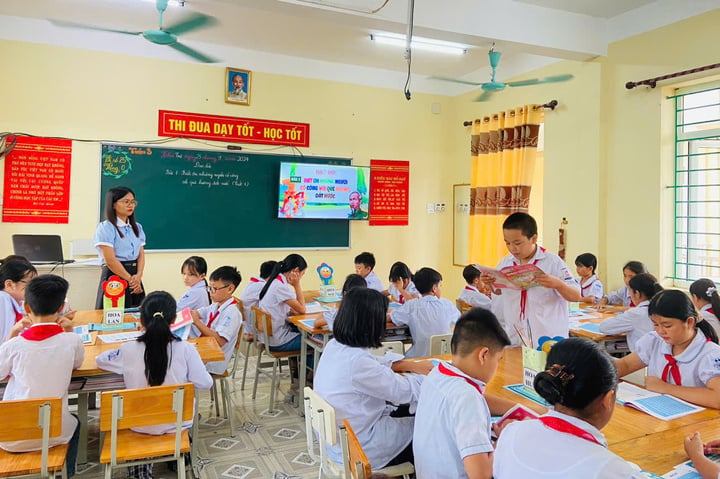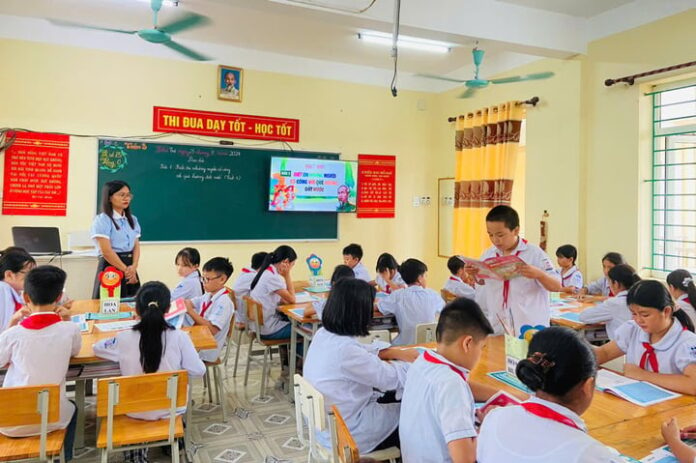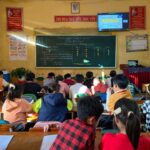The Ministry of Education and Training (MoET) has issued Official Dispatch No. 1581 to the People’s Committees of provinces and centrally-run cities regarding ensuring the maintenance and improvement of the quality and efficiency of public educational institutions at administrative units upon implementing the two-level local government model.
Specifically, after the two-tier local government goes into operation, the Government will assign the Ministry of Home Affairs to coordinate with relevant ministries and sectors to build and submit to the Government for amendment and supplementation or promulgation of new regulations related to the organization and operation of public non-business units to ensure their effective operation and meet the demands of the people.

Will schools be merged after the elimination of the district level? (Illustrative image)
In the field of education, the MoET requires localities to maintain public educational institutions and transfer them to the people’s committees of communes to perform the function of state management of education regarding secondary schools, primary schools, and kindergartens.
Meanwhile, vocational education centers and continuing education centers under the management of district-level People’s Committees will be transferred to the management of the provincial Departments of Education and Training. At the same time, they will be reorganized to provide management services by areas including multiple communes and wards.
Thus, after the implementation of the two-level local government model, regular schools will remain unchanged and will not be subject to merger. Vocational training centers and continuing education centers, however, may be merged or restructured depending on the development orientation of each locality.
Commune-level units are authorized to recruit teachers
In Official Dispatch 1581, the MoET also allows commune-level units to direct the recruitment of kindergarten teachers according to the number of employees approved by authorized agencies. At the same time, these units are permitted to decide on the number of labor contracts for positions in kindergartens, primary and secondary schools, ensuring sufficient human resources as required by the general education program.
Previously, the recruitment of public school teachers was carried out in the same manner as the recruitment of civil servants in general, by the Home Affairs sector and the People’s Committees of district and provincial levels. Henceforth, the function of recruiting teachers at different levels will be decentralized and empowered to commune-level units and provincial Departments of Education and Training.
- Advising and submitting to the Provincial People’s Committees and authorized agencies for approval regarding the number of jobs, the number of civil servants, and the total number of employees in public schools.
- Recruiting, employing, appointing, changing job titles, training, retraining, and evaluating teachers, educational managers, and staff of public schools.
- Developing plans for the recruitment, employment, and training of teachers in localities and schools within the province.
- Ensuring sufficient numbers of managerial civil servants and employees as per the scheme approved by the Provincial People’s Committee. Taking responsibility for explaining the activities, quality of education, teachers, employees, and students.
- Appointing, dismissing, transferring, and changing the positions of principals and vice-principals of schools.
- Regularly updating information about teachers and educational managers into the National Database on Education, which is also managed by the Provincial People’s Committees and the MoET.
Captivating Consumers: How Thien Long Wins Hearts with its Education-Centric CSR Strategy
For over 43 years, Thien Long has cultivated a unique position in the Vietnamese stationery market. Through enduring and effective campaigns, the brand has forged a strong connection with education, resonating deeply with Vietnamese consumers. This unwavering dedication to educational initiatives has solidified Thien Long’s reputation and longevity in the industry.
The Digital Revolutionaries: Bridging the Gap, One Student at a Time.
As Viettel embarked on the journey of implementing the School Internet program, they were well aware of the infrastructure challenges that lay ahead, particularly in underdeveloped areas. However, witnessing the transformative impact of the program on students, teachers, and schools, they found that their hardships paled in comparison.
“EQuest: A Triple Crown of ESG Excellence”
The EQuest Education Group has been recognized by the American Chamber of Commerce in Vietnam (AmCham Vietnam) at the 2024 ESG Impact Showcase awards. This marks the third consecutive year that EQuest has been acknowledged for its outstanding contributions to advancing ESG (Environmental, Social, and Governance) initiatives.





















